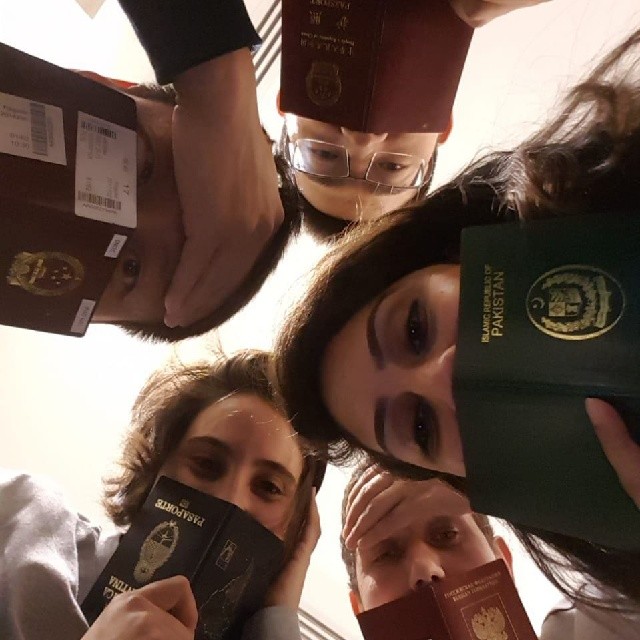As a global company doing business in more than 100 countries, inclusion and diversity of employees is key to our success. In this article, Chaman Iftikhar, who is an Engineer by qualification and profession, shares some of her experiences working with multicultural teams at FieldCore. Chaman, who is based in Pakistan, worked at GE for around two and a half years before joining FieldCore in 2018. She is a certified MkVIe Controls Field Engineer overseeing projects of Africa, India and Middle East region.
“My job scope demands a lot of travelling, mobilizing to the remotest sites, and staying there for a considerable period of time until the job is done. The beauty of my role is that I always stay on my toes, my work life is always full of surprises, and I keep looking forward to new and challenging experiences. I cherish the time I spend on turbine decks dealing with customers and GE colleagues deploying the solutions and I’m grateful for all the things I am learning through this experience at a relatively earlier stage of my career.”

The peculiarity of Chaman’s job, in addition to all the technical aspects, is that she is constantly interacting with a multicultural group of people. For her the biggest challenge of such diverse teams are language and communication barriers. Throughout the years spent at numerous sites, Chaman understood the true weight of the phrase “communication is the key”. “Some people are not fluent in English; others have a unique dialect or a way of conversing. It takes you some time to get familiar with people’s style of communication, but patience, empathy towards the differences and non-verbal communication skills come as a big help in those initial stages of team building.”
Despite some minor challenges “diverse workforce means diverse, unorthodox and out-of-the-box ideas. The possibility to interact with a diverse crowd of professionals and peers opened my mind to so many avenues and ideas, which I would never imagine by working with people of the similar mindset. Constant interaction with multicultural teams taught me to be more flexible, open-minded and tolerant, to respect and accept cultural, behavioral, ethnic and religious differences. In addition to that, it contributed to the increased creativity from our team that leads us to better performance and higher customer satisfaction every time we complete a project. Cherry on top, I also got to learn a few new words from a third language and learned about cross-cultural festivities and delicious cuisines. Always a nice experience!”
 Chaman’s first project that involved a multicultural team was the installation of a 9FA Gas Turbine at EGA (Emirates Global Aluminium) in UAE. She joined the team as a Controls Field Engineer in a support role to the lead Field Engineer. “I was part of a team of engineers that came from all the different corners of the world like India, China, Philippines, Oman, Canada, British, local Emirati residents and many more. It was a truly awe-inspiring experience.” Despite all the concerns and worries, as this was one of Chaman’s first assignments, her manager provided all the necessary support and helped her integrate with the team. “I found my team really welcoming and accommodating. I didn’t even feel that I was thousands of miles away from home. My team understood that I was new to the field and they did their best to make me feel included in every possible way. Uncomfortable political debates, cultural nuisances, stereotyping or general disrespect was something I never witnessed. Now when I look back, all I recall is the feeling of accomplishment after completing the 9FA installation combined with technical jokes, knowledge sessions, gatherings full of laughter, cheerful meals and of course immense mutual respect and good wishes for everyone in the crew.”
Chaman’s first project that involved a multicultural team was the installation of a 9FA Gas Turbine at EGA (Emirates Global Aluminium) in UAE. She joined the team as a Controls Field Engineer in a support role to the lead Field Engineer. “I was part of a team of engineers that came from all the different corners of the world like India, China, Philippines, Oman, Canada, British, local Emirati residents and many more. It was a truly awe-inspiring experience.” Despite all the concerns and worries, as this was one of Chaman’s first assignments, her manager provided all the necessary support and helped her integrate with the team. “I found my team really welcoming and accommodating. I didn’t even feel that I was thousands of miles away from home. My team understood that I was new to the field and they did their best to make me feel included in every possible way. Uncomfortable political debates, cultural nuisances, stereotyping or general disrespect was something I never witnessed. Now when I look back, all I recall is the feeling of accomplishment after completing the 9FA installation combined with technical jokes, knowledge sessions, gatherings full of laughter, cheerful meals and of course immense mutual respect and good wishes for everyone in the crew.”
But it cannot all be smooth, especially when you are a woman pursuing a career in a male-dominated field of STEM. Chaman’s only negative experience is associated with ethnical stereotypes. “I am proud to carry all of the cultural values of my country with me wherever I go but I am strongly against the prejudgment of a person on the basis of them belonging to a certain country.” she highlights. In Chaman’s experience, these misconceptions have been related to terrorism, women oppression topics, conservative society, or even judgement of her abilities and skills based on belonging to an under-developed country. But she is aware that such cases can potentially occur, and she is approaching it with a clear mind. “The key is to understand and respect these differences and avoid any pre-judgement. You have to enlighten the other person that 99% of these are misconceptions. Every person has his/her own persona, irrespective of ethnicity, just like all French must not be romantics and all Italians must not be painters 😉”
“The key is to understand and respect these differences and avoid any pre-judgement. You have to enlighten the other person that 99% of these are misconceptions. Every person has his/her own persona, irrespective of ethnicity, just like all French must not be romantics and all Italians must not be painters 😉”
In order to achieve understanding and synergy within the multicultural team it is key “to keep yourself open and flexible towards accepting and respecting the differences of your teammates. I always respect others’ cultural norms and values. I listen to their experiences back from their home countries, try to take home all the positives with me and appreciate them for who they are open heartedly.” Chaman’s favorite quote in the context of respecting differences is by David Livermore: “There’s a fine line between being aware of culture differences and stereotyping. When you paint groups of people with a broad brush, such as thinking that all people from a certain region behave a certain way, you’ve likely crossed it.”



